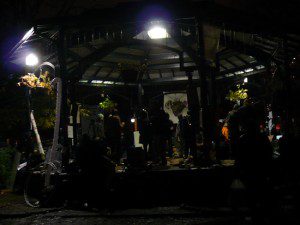
The comment was bold and brutal. The man on the other end of the phone was blunt and to the point. He pulled no punches. His voice was full of disgust.
“You’re lazy. You’re vagrants. You’re a bunch of hoodlums, drug addicts and anarchists” he said on the phone. “Get out of our park!”
Earlier this week, I sat in as substitute host for the Rogers TV program, “Dale Goldhawk Live.” Its regular host, Dale Goldhawk, interviews people at the centre of contemporary issues and invites viewers to call in with their opinions and questions. Monday night, I was Goldhawk for an hour and the program explored the controversy surrounding the Occupy Toronto movement and its month-long occupation of the park adjacent to the St. James Cathedral in downtown Toronto. As usual, the program asked its panellists and viewers to answer a question.
“Should the City of Toronto evict the Occupy Toronto protestors from St. James Park?” I asked near the beginning of the program.
And, well, the first caller I just quoted, had no time for the movement or its principles. Hearing that kind of vitriol that early in the program, I got a sinking feeling. I feared I’d have to leap to the defence of the panel of young, Occupy Toronto protestors that the show had invited to the studio. But I was wrong. One of my guests, Anna Crooke, a 20-something Occupy Toronto protester, didn’t bat an eye.
“I’m a freelance director. I manage a small company of my own. I’m shooting a number of commercial films two days a week,” she said. “And the rest of my volunteer time, I’m devoting to this occupation.”
“What about the hoodlums and drug addicts?” I asked.
“I’ve been in and around the park for most of the last month and I haven’t seen any vagrancy or drug abuse,” she said.
Not only did this young woman fend off the offensive language of the caller, I thought, she also managed to set the record straight about the nature of the people in the protest. They weren’t vagrants and criminals.
And when I asked another of the Occupy Toronto guests in the studio about what the protesters wanted, I heard from Kevin Konnyu, who was also juggling a couple of jobs including some of the media relations for the protest. He pointed out that it wasn’t so much a protest as it was peaceful campaign for fair treatment. Occupy Toronto had begun, he explained, on Oct. 15 as a peaceful demonstration in the financial district to express discontent over what it called “economic equality” and “corporate greed.”
“We’re not here to make a point,” the protest’s website said, “but to bring about change.”
I know. It seems awfully rhetorical, airy-fairy and even based in an anti-establishment jargon. But I can remember a time (indeed I participated in such demonstrations in my 20s) when we went to the streets to protest such juggernauts as the U.S. escalation of the war in Vietnam. We marched to the U.S. Embassy on University Avenue in Toronto during the 1960s and early ’70s fully expecting the White House and the Pentagon to take notice of us and stop the war. Well, be darned if television didn’t notice us, give us our 15 minutes of fame and eventually prompt Walter Cronkite to recommend a halt to U.S. troop surges in South East Asia and the initiation of peace talks and an admirable withdrawal.
More important than any of that, the people in the Occupy Toronto movement, I discovered on the show the other night, have their feet planted firmly on the ground. When a caller to the show finally did ask them what change protesters actually expected to see, the three youthful representatives said they weren’t out to change the world, but to improve things for less-fortunate Torontonians.
“There are people in St. James Park,” one of the panellists said, “in need of social assistance, medicine and food. They’re the Torontonians who’ve fallen through the cracks. So if the movement gives them a bit of attention, then we’ve accomplished something.”
All week long we’ve been hearing the way major city administrations have dealt with the various Occupy movements. They’ve cracked heads in Oakland, California, confiscated tents and belongings in New York, and sent in the riot police in Portland, Oregon. Tuesday, they handed out eviction notices in Toronto, but faced a stay from the courts until Saturday. Still, I marvel at the peaceful attitude of the occupiers I met in the TV studio and wonder why mayors, councillors and the media don’t just stop long enough to listen to some of their simple protestations.
The naysayers might discover something a lot less threatening than hoodlums, drug addicts and anarchists in the Occupy Toronto message.
Hi Ted – Thanks for remembering “The Diamond Lane”. I had a great time writing the show and a great time this morning reliving it. Lookingat your web site I am reminded of Bill Cameron. He was my brother-in-law. Did you know him? He was my brother in law.
Best
David